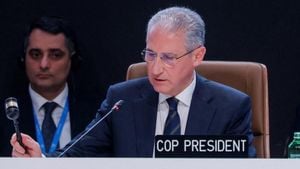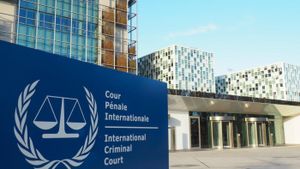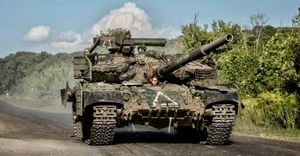NATO Secretary General Mark Rutte recently met with U.S. President-elect Donald Trump at his residence in Florida, marking a significant event as both leaders navigated pressing security concerns, especially pertaining to NATO's future and its relationship with Ukraine.
During the meeting held on November 23, the two officials discussed various security matters facing the military alliance. The nature of these discussions remains somewhat murky, as neither side has released detailed accounts of the topics covered. The backdrop to this high-profile meeting features increasing worries about how Trump's return to office could affect U.S. support for Ukraine amid its drawn-out conflict with Russia and NATO's stability.
The timing is especially poignant, considering Trump's earlier remarks during his presidential campaign, where he provocatively stated, "Russia could do whatever the hell they want" concerning NATO member countries not fulfilling their defense spending obligations. This commentary has raised eyebrows and concerns within NATO circles about Trump's future position on military support and defense spending—issues Rutte is acutely aware of, especially with the Ukraine conflict raging on.
Rutte's meeting with Trump follows conversations he had previously with other European leaders discussing the necessity for all NATO members to invest adequately in defense. During his own comments at the Budapest summit earlier this month, Rutte backingly supported Trump's calls for NATO members to allocate more than the existing target of 2% of GDP on defense. This reiteration of support suggests Rutte is hopeful for continuity from Trump on issues of defense spending, even as the potential for decreased U.S. backing looms large due to Trump’s unpredictable policy directions.
Accompanying Rutte to this meeting were U.S. Congressman Mike Waltz, who is anticipated to join Trump’s national security team as the national security adviser. Waltz has previously expressed skepticism about U.S. military aid allocations to Ukraine, advocating for European nations to step up their financial responsibilities instead. His presence among Trump's advisors indicates the potential direction of U.S. national security policy under Trump's influence.
Supporting Ukraine has become increasingly contentious, with questions arising whether Trump would uphold the United States' role firmly within NATO and steadfastly support Ukraine against Russian advances. Since becoming president, Trump has frequently criticized NATO, dubbing it 'obsolete.' Such views cast doubt on just how solid NATO's cohesiveness will be and how committed its largest member, the U.S., remains to the alliance’s foundational ethos of collective defense.
There remains some cautious optimism among NATO allies, particularly if support for Ukraine is framed as part of demonstrating U.S. strength on the world stage. Allies are concerned particularly about any shifts toward isolationism or reduced engagement with Ukraine—a change Trump had hinted at throughout his campaign.
The meeting began with congratulatory notes from Rutte to Trump for his election victory. Rutte sent out messages on social media, expressing his belief about the importance of Trump’s leadership being pivotal for NATO, emphasizing once more the old adage of “peace through strength.” Supporting his sentiments, Rutte's strategy seems aimed at fostering unity across the alliance, ensuring collective defense remains front and center of NATO’s agenda.
This collaboration between Rutte and Trump may be viewed as strategic, hoping to align defense priorities as NATO grapples with the dual challenges of Russian aggression and the internal dynamics of member nations with varying military commitments. The underlying theme of Rutte’s dialogues with EU counterparts and now Trump hints at the necessity for firm commitments to defense spending and support for allied nations embroiled in conflicts.
While Trump takes the reins of power once more, this meeting sets the stage for determining the future of NATO’s influence globally, especially as member nations analyze their own security needs against the backdrop of American policy shifts.
The stakes are incredibly high, not just for the level of commitment to military support for Ukraine but also for how American foreign policy will shape the future security architecture of Europe.



